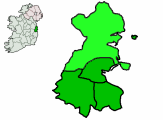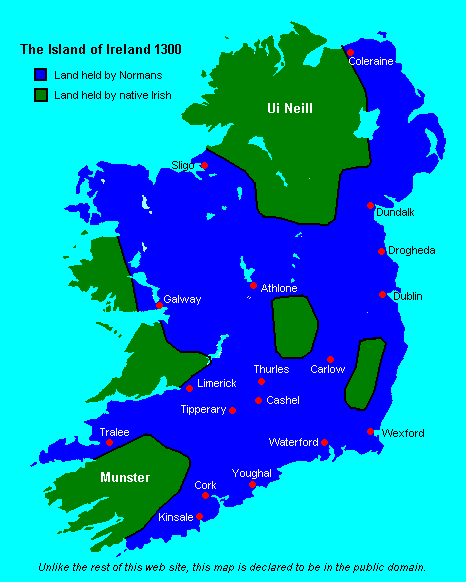|
Forth And Bargy Dialect
Yola, historically the Forth and Bargy dialect, is a revived Anglic language once spoken widely in the baronies of Forth and Bargy in County Wexford, Ireland. It is thought to have evolved from Middle English, which was brought to Ireland during the Norman invasion, beginning in 1169. As such, it was similar to the Fingallian language of the Fingal area. Both became functionally extinct in the 19th century when they were replaced by modern Hiberno-English, although Yola was not officially extinct until the death of the last speaker, a local fisherman of Kilmore Quay named Jack Devereux, in 1998. The name "Yola" means "old" in the language. History The language was spoken in County Wexford, particularly in the baronies of Forth and Bargy. This was the first area English-speakers came to in the Norman invasion of Ireland, supporting the theory that it evolved from the Middle English introduced in that period. As such it is thought to have been similar to Fingallian, whic ... [...More Info...] [...Related Items...] OR: [Wikipedia] [Google] [Baidu] |
Republic Of Ireland
Ireland ( ga, Éire ), also known as the Republic of Ireland (), is a country in north-western Europe consisting of 26 of the 32 Counties of Ireland, counties of the island of Ireland. The capital and largest city is Dublin, on the eastern side of the island. Around 2.1 million of the country's population of 5.13 million people resides in the Greater Dublin Area. The sovereign state shares its only land border with Northern Ireland, which is Countries of the United Kingdom, part of the United Kingdom. It is otherwise surrounded by the Atlantic Ocean, with the Celtic Sea to the south, St George's Channel to the south-east, and the Irish Sea to the east. It is a Unitary state, unitary, parliamentary republic. The legislature, the , consists of a lower house, ; an upper house, ; and an elected President of Ireland, President () who serves as the largely ceremonial head of state, but with some important powers and duties. The head of government is the (Prime Minister, liter ... [...More Info...] [...Related Items...] OR: [Wikipedia] [Google] [Baidu] |
Fingallian
Fingallian or the Fingal dialect is an extinct Anglic language formerly spoken in Fingal, Ireland. It is thought to have been an offshoot of Middle English, which was brought to Ireland during the Norman invasion, and was extinct by the mid-19th century. Although little is known of Fingallian, it is thought to have been similar to the Forth and Bargy dialect of County Wexford. The surviving literature of Fingallian consists of two satirical or humorous poems, the short "Fingallian Dance" and the much longer ''Purgatorium Hibernicum''. Both poems are anonymous and are thought to be humorous parodies of Fingallian by non-native speakers, so their value from a linguistic point of view may be limited. History Fingallian was spoken in the region of Fingal, traditionally the part of County Dublin north of the River Tolka. It was spoken in the area near the northern border. The name "Fingal" is from the Irish ''Fine Gall'', or "territory of foreigners", probably a reference to ... [...More Info...] [...Related Items...] OR: [Wikipedia] [Google] [Baidu] |
Dutch Language
Dutch ( ) is a West Germanic language spoken by about 25 million people as a first language and 5 million as a second language. It is the third most widely spoken Germanic language The Germanic languages are a branch of the Indo-European language family spoken natively by a population of about 515 million people mainly in Europe, North America, Oceania and Southern Africa. The most widely spoken Germanic language, E ..., after its close relatives German language, German and English language, English. ''Afrikaans'' is a separate but somewhat Mutual intelligibility, mutually intelligible daughter languageAfrikaans is a daughter language of Dutch; see , , , , , . Afrikaans was historically called Cape Dutch; see , , , , , . Afrikaans is rooted in 17th-century dialects of Dutch; see , , , . Afrikaans is variously described as a creole, a partially creolised language, or a deviant variety of Dutch; see . spoken, to some degree, by at least 16 million people, mainly in Sou ... [...More Info...] [...Related Items...] OR: [Wikipedia] [Google] [Baidu] |
Kathleen Browne
Kathleen Anne Browne (1 October 1876 – 9 October 1943) was an Irish politician, farmer, writer, historian and archaeologist. She was arrested after the Easter Rising and held in Kilmainham Gaol. During the Civil War, she was Pro-Treaty and joined Cumann na nGaedheal. She was a member of Seanad Éireann from 1929-36. She was a fluent speaker of Yola, an Anglic language of Wexford. Early life Browne was born on 1 October 1876 to Michael Browne, a farmer, shopkeeper and local politician, and Mary Eleanor Stafford. She was the eldest of five children. Her father's family was of Norman extraction and had lived at Rathcronan Castle since the 13th century. Her mother's family lived in Baldwinstown Castle, County Wexford. Michael Browne was a poor law guardian and a member of Wexford's first County Council. He supported Home Rule and had worked with Charles Stewart Parnell. Browne was educated at a convent school in Wexford. As a child, she shared her father's interest in poli ... [...More Info...] [...Related Items...] OR: [Wikipedia] [Google] [Baidu] |
Alexander John Ellis
Alexander John Ellis, (14 June 1814 – 28 October 1890), was an English mathematician, philologist and early phonetician who also influenced the field of musicology. He changed his name from his father's name, Sharpe, to his mother's maiden name, Ellis, in 1825 as a condition of receiving significant financial support from a relative on his mother's side. He is buried in Kensal Green Cemetery, London. Biography He was born Alexander John Sharpe in Hoxton, Middlesex to a wealthy family. His father, James Birch Sharpe, was a notable artist and physician who was later appointed Esquire of Windlesham. His mother, Ann Ellis, was from a noble background, but it is not known how her family made its fortune. Alexander's brother James Birch Sharpe junior died at the Battle of Inkerman during the Crimean War. His other brother, William Henry Sharpe, served with the Lancashire Fusiliers after moving north with his family to Cumberland, due to military work. Alexander was educate ... [...More Info...] [...Related Items...] OR: [Wikipedia] [Google] [Baidu] |
Relict
A relict is a surviving remnant of a natural phenomenon. Biology A relict (or relic) is an organism that at an earlier time was abundant in a large area but now occurs at only one or a few small areas. Geology and geomorphology In geology, a relict is a structure or mineral from a parent rock that did not undergo metamorphosis when the surrounding rock did, or a rock that survived a destructive geologic process. In geomorphology, a relict landform is a landform formed by either erosive or constructive surficial processes that are no longer active as they were in the past. A glacial relict is a cold-adapted organism that is a remnant of a larger distribution that existed in the ice ages. Human populations As revealed by DNA testing, a relict population is an ancient people in an area, who have been largely supplanted by a later group of migrants and their descendants. In various places around the world, minority ethnic groups represent lineages of ancient human migrations i ... [...More Info...] [...Related Items...] OR: [Wikipedia] [Google] [Baidu] |
Gaelicisation
Gaelicisation, or Gaelicization, is the act or process of making something Gaelic, or gaining characteristics of the ''Gaels'', a sub-branch of celticisation. The Gaels are an ethno-linguistic group, traditionally viewed as having spread from Ireland to Scotland and the Isle of Man. ''Gaelic'', as a linguistic term, refers to the Gaelic languages but can also refer to the transmission of any other Gaelic cultural feature such as social norms and customs, music and sport. It is often referred to as a part of Celtic identity as Ireland, Scotland and the Isle of Man are all considered Celtic Nations, and the Gaelic languages are considered a sub-group of the Celtic languages. Early history Examples of Gaelicisation in history include the Picts, Hiberno-Normans, Scoto-Normans and Norse-Gaels. Modern era Today, Gaelicisation, or more often re-Gaelicisation, of placenames, surnames and given names is often a deliberate effort to help promote the languages and to counteract ce ... [...More Info...] [...Related Items...] OR: [Wikipedia] [Google] [Baidu] |
Old English (Ireland)
From the 12th century onwards, a group of Normans invaded and settled in Gaelic Ireland. These settlers later became known as Norman Irish or Hiberno-Normans. They originated mainly among Cambro-Norman families in Wales and Anglo-Normans from England, who were loyal to the Kingdom of England, and the English state supported their claims to territory in the various realms then comprising Ireland. During the High Middle Ages and Late Middle Ages the Hiberno-Normans constituted a feudal aristocracy and merchant oligarchy, known as the Lordship of Ireland. In Ireland, the Normans were also closely associated with the Gregorian Reform of the Catholic Church in Ireland. Over time the descendants of the 12th-century Norman settlers spread throughout Ireland and around the world, as part of the Irish diaspora; they ceased, in most cases, to identify as Norman, Cambro-Norman or Anglo-Norman. The dominance of the Norman Irish declined during the 16th century, after a new English Pr ... [...More Info...] [...Related Items...] OR: [Wikipedia] [Google] [Baidu] |
Dublin
Dublin (; , or ) is the capital and largest city of Ireland. On a bay at the mouth of the River Liffey, it is in the province of Leinster, bordered on the south by the Dublin Mountains, a part of the Wicklow Mountains range. At the 2016 census it had a population of 1,173,179, while the preliminary results of the 2022 census recorded that County Dublin as a whole had a population of 1,450,701, and that the population of the Greater Dublin Area was over 2 million, or roughly 40% of the Republic of Ireland's total population. A settlement was established in the area by the Gaels during or before the 7th century, followed by the Vikings. As the Kingdom of Dublin grew, it became Ireland's principal settlement by the 12th century Anglo-Norman invasion of Ireland. The city expanded rapidly from the 17th century and was briefly the second largest in the British Empire and sixth largest in Western Europe after the Acts of Union in 1800. Following independence in 1922, Dubli ... [...More Info...] [...Related Items...] OR: [Wikipedia] [Google] [Baidu] |
Yola Hut -Tagoat Co
Yola may refer to: Culture * Yola language, Forth and Bargy dialect, an Anglic language, historically of County Wexford, Ireland * Jola people, of Africa Music * ''Yola'' (album), a 2001 album by Eleanor McEvoy * YOLA, Youth Orchestra Los Angeles * Yowlah, folk dance native to the United Arab Emirates and Oman Places * Yola, Adamawa, capital of Adamawa State, Nigeria ** Yola Airport, airport in the Adamawa State of Nigeria * Yola North, a Local Government Area of Adamawa State, Nigeria * Yola South, a Local Government Area of Adamawa State, Nigeria * Yola Diocese, a diocese of the Anglican Church of Nigeria in the Province of Jos * County of Yola, the original name of Yolo County, California People * Yola (singer) (born 1983), English singer-songwriter * Yola Berrocal (born 1970), Spanish media personality, dancer, singer, and actress * Yola Cain (1954–2000), Jamaican-born aviator * Yola d'Avril (1906–1984), French-born actress * Yola Ramírez (born 1935), intern ... [...More Info...] [...Related Items...] OR: [Wikipedia] [Google] [Baidu] |


